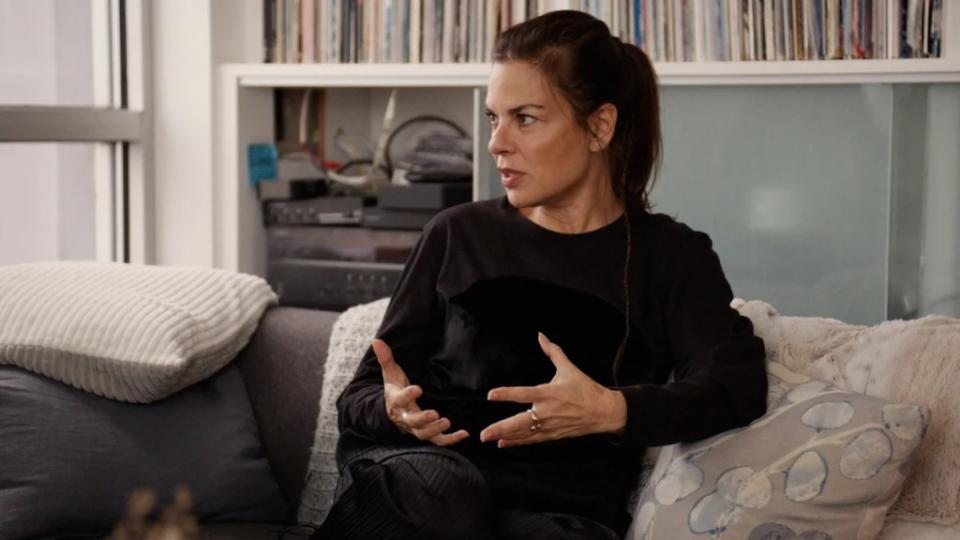Dr. Orna Guralnik Takes the Shame Out of ‘Couples Therapy’
“Couples Therapy” gives everyone a seat on Dr. Orna Guralnik’s couch. The award-winning docuseries brings a new twist to reality TV, enticing audiences with a glimpse into the raw challenges of others’ relationships.
The deeply personal and often juicy details from the lives of the show’s subjects have kept audiences engaged since 2019 when the show initially premiered on Showtime. Dr. Guralnik, referred to by her patients and fans alike as simply Orna, leads the show with her calm demeanor, gently guiding couples to paths forward, either together or apart.
Season 4 dropped May 31, this time welcoming a polyamorous throuple – a first for the show. Guralnik, a clinical psychologist and psychoanalyst practicing in New York City, says diversity in her client base has always been a priority.
“It was absolutely important to represent real people, and real people are indeed very diverse,” she told TheWrap. “The whole point of couples work is contending with otherness.”
“Couples Therapy” premiered pre-pandemic as conversations around mental health and therapy exploded nationwide. Guralnik believes that the show is part of breaking down those barriers and welcoming people into the conversation, saying, “I like to think of it as piercing through all sorts of firewalls.”
“’What on earth happens behind closed doors in couples therapy?’” Guralnik posed. “‘Does that mean you’re breaking up? Does that mean it’s a terribly shameful thing?’ And here we’re showing that, no, this is a place where people really learn how to relate to each other better. It’s not a shameful thing. It’s a place of learning and growth.”
And in four seasons, Guralnik and the production team have proven that.

A May 2024 study by the USC Annenberg Inclusion Initiative in collaboration with Showtime/MTV Entertainment Studios examined how mental health representation in television affects audience’s attitudes and behaviors.
Researchers found that “Couples Therapy,” one out of the 13 shows involved in the study, caused the most significant changes for viewers. The study deduced that viewers of the docuseries had the greatest reduction in personal stigma around mental health treatment and the greatest willingness to seek therapy, with 24% of participants reporting that they reached out to ask for support.
Still, Guralnik said her greatest fear in joining a TV project was the misrepresentation and sensationalization of her clients and therapy at large, a worry that was squashed after seeing the first cuts of Season 1.
As opposed to her private practice clients who she builds years-long relationships with, Guralnik only has 15 to 20 hour-long sessions with “participants” on the show. When asked about how she approaches the shorter timeline, she explained how the added urgency often leads to faster results.
“When people know that there’s a finite unit of time, it arranges itself into an arc,” she said. “The death of the treatment is in plain sight, so the treatment gets organized like that. It has a beginning, and we know the end.”
While Guralnik is deeply involved in the show, she is not on board as a producer. As the seasons progress, she says she’s gotten more involved in post-production, but she mostly places everything in the hands of the filmmakers.
“There’s a difference between the arc of a treatment, the arc of what happens in a session, and then the editorial building of an arc,” she said. “I’m not the editor, I’m the therapist.”
With her psychoanalysis treatment work, Guralnik said it can sometimes take two years to really get a sense of someone, but in couples therapy, the process can be accelerated.
“In couples therapy, it’s somewhat different, because it’s not that the couples are only reporting about what’s going on at home or in their relationship. They’re also enacting it in vivo in the session,” she said. “I see it unfolding right in front of me, it’s not just reporting what’s going on over there in real life. Real life is in my office.”
Viewers are welcomed to see Dr. Guralnik the therapist versus Orna the human being, specifically in her postmortem interactions with mentor Dr. Virginia Goldner. Guralnik originally told the directors that she planned to engage her adviser, as she does with her private practice treatment, to ensure that she was doing her work responsibly — and production jumped at the opportunity to show this other side to their star.
At first, Guralnik worried it may interfere with the vulnerable part of her process, but found the peek behind the curtain served as a teaching tool for the audience, contributing to the “ultimate purpose of the show.” She also found that this process legitimized her decades of training and practice.
“It’s a really serious profession. It’s not like a willy-nilly kind of thing. There is deep theory involved; a lot of thought, a lot of consultation. We take this job very seriously,” she emphasized.
Four seasons in, the psychoanalyst insists that any potential award season buzz is “not for me, personally.”
“The people who have been working so hard to make this show and to do it with such perfectionism and such talent, they deserve all the awards in the world,” Guralnik humbly stated. “The filmmakers are just really, really extraordinary artists and extraordinary people. So I’m deeply rooting for them.”
All episodes of the docuseries are available to stream on Paramount+, with episodes airing weekly on Showtime.
The post Dr. Orna Guralnik Takes the Shame Out of ‘Couples Therapy’ appeared first on TheWrap.


